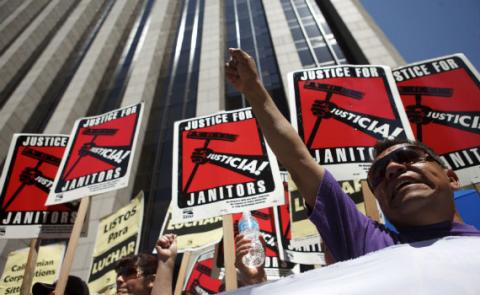During the last half century, private sector unionism has endured a rather brutal death march. Almost every year, we learn once again that the percentage of private sector workers who are union members has declined to a new record low. For the most part, the decline has been a gradual affair, with private sector unions slowly suffocating under America's uniquely terrible labor laws. In the coming year, however, this slow demise could hasten considerably, courtesy of the Supreme Court.
In the shadow of the intense media coverage last month surrounding the Voting Rights Act, affirmative action, the Defense of Marriage Act, and Proposition 8, the justices quietly agreed to hear two cases that could devastate unions in the private sector.
The first case, Noel Canning v. NLRB, arises out of the dysfunction gripping the U.S. Senate. For years now, the chamber's Republican minority has refused to confirm presidential appointments to the National Labor Relations Board, the government agency that protects the union rights of workers. As a result, the NLRB has struggled to maintain the three-member quorum necessary for it to legally function. To circumvent Senate obstruction, President Obama has been forced to name new NLRB members during Senate recesses. To choke off these appointments, Senate Republicans have more recently refused to go into recess by seizing upon technicalities that keep the body perpetually in session.
Despite this maneuvering, President Obama continued to make recess appointments to the NLRB without seeking Senate confirmation. His administration has argued that the Senate goes into recess when it effectively shuts down, even if the Senate claims it is still in session. To finally resolve this conflict, the Supreme Court in the Noel Canning case will decide under what circumstances the President can make recess appointments to the NLRB. Given the conservative orientation of the present Supreme Court, it is entirely possible that these recess appointments will be ruled invalid.
Such a ruling would essentially give Senate Republicans a blank check to neuter the only agency empowered to enforce the country's labor laws.
A non-functional NLRB would, for instance, leave workers illegally fired or intimidated by employers during union organizing drives with nowhere to turn. Additionally, without an NLRB to resolve union election disputes, unions may find it nearly impossible to become the certified representatives of new groups of workers. It is hard to imagine any union successfully organizing new workers under these conditions.
The second case, Mulhall v. UNITE HERE Local 355, calls into question what is probably the most successful union organizing strategy of last decade. Because our labor laws are so unfriendly to workers, major unions -- including SEIU, UNITE HERE, and CWA, among others -- often seek to enter into so-called "organizing agreements" with employers. These deals establish the rules that the unions and employers must follow in subsequent organizing battles. The most common provisions require employers to remain neutral about the union and to recognize it as soon as the majority of their employees sign cards authorizing it to represent them.
In Mulhall, these agreements are being challenged under anti-corruption laws that prevent employers from providing "things of value" to unions. If the Supreme Court decides that organizing agreements are unlawful, the only promising unionization strategy in recent years will die.
By themselves, either of these cases could deliver debilitating blows to a union movement already badly wounded from years of steady decline. Combined, they could be a death sentence to new private sector organizing altogether. This is especially true because of the special way they interact. One of the chief advantages of the organizing agreements challenged in Mulhall is that they make it easier to form new unions without the NLRB. Without them, unions will have no choice but to rely on the NLRB, which may then be rendered powerless by Noel Canning.
Private sector unions are already in decline. But this is the one-two punch that could cripple them for good.


Spread the word